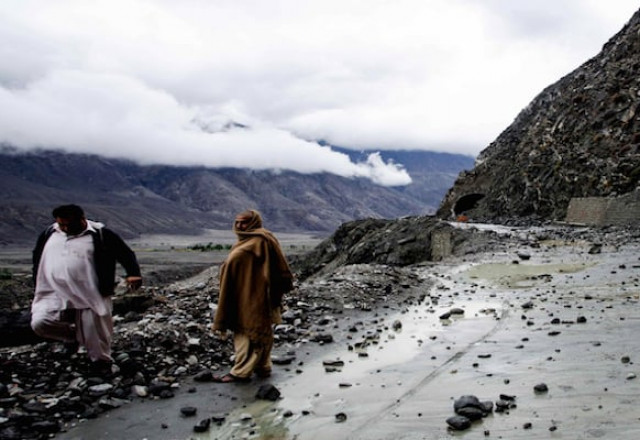Dark winters, bright solutions
Micro-hydropower gains traction in G-B, lighting up the region

Dark cold nights, halted businesses in day, and unbearable difficulties in moving around by the ordinary people is the routine life for around half-million residents of Gilgit, when the winter descends upon the region and power outages stretch up to 21 hours a day.
Gilgit-Baltistan (G-B) region has abundant water resources but things change as November sets in, heralding the arrival of the winter chill. A dire weather then continues up to May. During this period water sources freeze in sub-zero temperatures, which means no hydropower generation.
For almost half a year, the people in Gilgit-Baltistan endure freezing temperatures without heat or light. Though, according to some estimates, the region has the capacity to generate 60 megawatts of hydel power, the energy crisis is not going away.
"It's not the Shangri-La the world imagines," says Akram Khan, a Gilgit native, who is now settled in England. "For the locals, the region's scenery and the abundant natural resources hold little value because successive governments have failed to utilize them effectively."
Frequent protests have also erupted across the region during peak winter months as frustrations boil over. "We've been promised solutions time and again, but nothing ever changes," laments Fatima, a mother of three in Gilgit town.
Only last week, protestors blocked the main city road in Gilgit for hours, demanding an end to the prolonged outages. Government initiatives, such as the deployment of diesel generators at a cost of Rs2 billion in 2022, have failed to mitigate the problem often amid allegations of corruption.
In this situation, some community-driven projects such as the micro hydropower projects (MHPs) offer a glimmer of hope. The MHPs are emerging in the region as a beacon of light for sustainable and reliable energy solutions.
One story of resilience and transformation unfolds in Borth, a remote village in Ishkoman Valley, where local resident Saeed Gul oversees a community-managed MHP that powers up light and hope to the Valley. "Winters were dark and cold before. Now, we have electricity, even in the harshest months."
The powerhouse, constructed in partnership with the Aga Khan Rural Support Programme (AKRSP) and funded under the Central Asia Poverty Programme (CAPP), became operational in 2017, according to the local residents.
The powerhouse is currently owned and operated by the local community, aimed at providing uninterrupted electricity to over 300 households and six schools. There are plans to extend its reach to 660 households across 10 villages in near future.
In the nearby village of Badswat, which is located just a kilometre away from Borth, the story is starkly different. Devastated by glacial lake outburst floods (GLOFs) triggered by climate change, Badswat's residents have lost homes, infrastructure, and livelihoods.
Unlike Borth, where electricity powers homes and provides the much-needed warmth in winter, Badswat's community remained heavily dependent on firewood from surrounding forests to survive the freezing cold. This reliance adds to the environmental strain in an already fragile ecosystem.
Since its inception in 1982, the AKRSP has supported the construction of 169 micro and mini-hydropower projects across remote areas of G-B and Chitral in Khyber-Pakhtunkhwa (K-P), with a combined functional capacity of 18.6MW.
These projects – which have won the Energy Globe and Ashden Awards for their innovative rural electrification in the G-B and K-P – now deliver clean, reliable energy to over 250,000 people.
"This isn't just about electricity," says Yasir Khan, an energy expert from the region. "These projects reduce reliance on fossil fuels, curbing deforestation and mitigating climate impacts," he added while speaking about the AKRSP projects.
Changing Climate
The energy crisis in G-B is exacerbated by climate change, with the region's 7,000 glaciersthe largest concentration outside the polesmelting at an alarming rate. The MHPs offer a sustainable solution, reducing reliance on forests for fuel and providing clean electricity to ease environmental pressure.
Salaar Ali, head of the Department of Environmental Science at the University of Baltistan, underscores the urgency of addressing this issue: "The loss of glaciers is a grave concern. We must adopt environment-friendly measures to preserve these vital resources," he said, referring to MHPs.
With funding from the European Union (EU), the AKRSP has launched the Energy-Plus programme to address these challenges and foster a climate resilient low-carbon economy and society in Gilgit Baltistan and Chitral.
The 31 million initiative aims to benefit over 350,000 people by prioritising underserved communities with little or no access to reliable energy.
The programme aligns with Pakistan's national priorities and commitments to international agreements such as the Paris Agreement to use a comprehensive strategy for energy access, climate change, and sustainable development through community, private sector, and policymaker collaboration.



















COMMENTS
Comments are moderated and generally will be posted if they are on-topic and not abusive.
For more information, please see our Comments FAQ